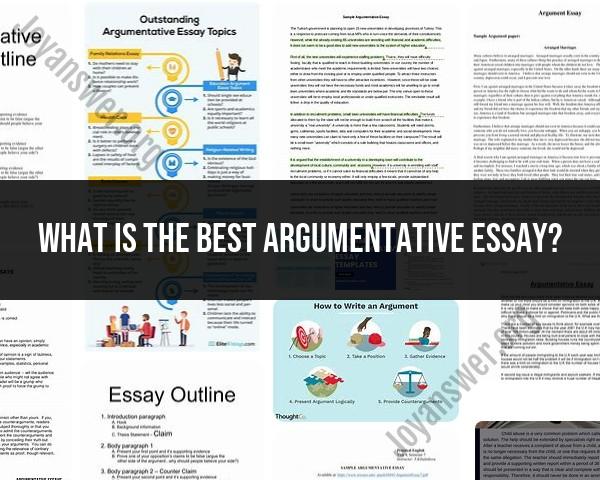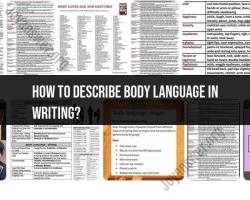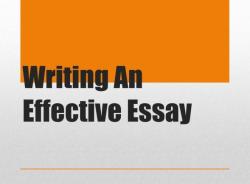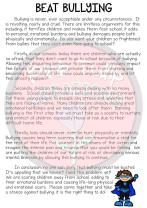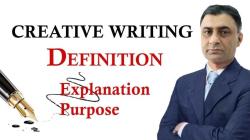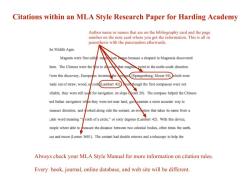What is the best argumentative essay?
Determining the "best" argumentative essay can vary based on several factors. However, here are criteria to assess the quality and effectiveness of an argumentative essay:
1. Clarity of Argument
- Thesis Statement: A clear, concise, and debatable thesis statement is essential to guide the entire essay.
- Logical Flow: The essay should present a logical progression of arguments and counterarguments.
2. Supporting Evidence
- Research and Sources: Strong argumentative essays rely on credible sources and evidence to support claims.
- Relevance and Reliability: Evidence should be relevant, current, and from reputable sources.
3. Counterarguments and Rebuttals
- Addressing Counterarguments: Effective essays acknowledge opposing viewpoints and refute them logically.
- Strength in Rebuttals: The essay should provide robust rebuttals, addressing potential weaknesses in the opposing arguments.
4. Organization and Structure
- Introduction and Conclusion: A compelling introduction that grabs attention and a conclusion that summarizes key points and reinforces the thesis.
- Clear Paragraph Structure: Each paragraph should focus on a single idea, with clear transitions between paragraphs.
5. Persuasive Language and Tone
- Use of Persuasive Techniques: Employ rhetorical devices, persuasive language, and tone to sway the audience.
- Avoiding Bias: Maintain an objective tone while presenting arguments, avoiding personal bias or fallacies.
6. Audience Awareness
- Tailored to Audience: Consideration of the audience's background, beliefs, and knowledge to effectively persuade.
7. Originality and Critical Thinking
- Original Perspective: Offering unique insights or perspectives on the topic can make an essay stand out.
- Critical Analysis: A strong argumentative essay showcases critical thinking by analyzing and interpreting the evidence.
8. Ethical Considerations
- Ethical Use of Evidence: Properly cite and attribute sources, avoiding plagiarism.
- Respectful Argumentation: Maintain respect for differing opinions and avoid using disrespectful language.
9. Impact and Engagement
- Engaging Writing Style: Use of engaging anecdotes, examples, or compelling language to captivate the audience.
- Leaves an Impression: A great argumentative essay leaves the reader thinking or considering the presented ideas even after finishing the essay.
10. Revision and Editing
- Proofreading: Free from spelling, grammar, and punctuation errors.
- Revision: A well-revised essay that shows refinement in language and argumentation.
Ultimately, the "best" argumentative essay effectively persuades the audience, presents a well-supported argument, acknowledges opposing viewpoints, and leaves a lasting impact on the reader while maintaining ethical and logical integrity.
What qualities characterize an outstanding argumentative essay?
An outstanding argumentative essay possesses a unique combination of clear structure, persuasive strategies, strong evidence, and engaging writing. Here are the key qualities that set it apart:
1. Clear Thesis Statement:
- A strong thesis statement clearly states the main argument of the essay and provides a roadmap for the entire paper.
- It is concise, specific, and debatable, offering a clear direction for the essay's development.
2. Logical Organization:
- The essay follows a logical structure that guides the reader through the argument.
- Introduction, body paragraphs, and conclusion are well-organized and seamlessly connected.
- Transitions are smooth and ensure a natural flow of ideas.
3. Compelling Evidence:
- The essay is supported by strong evidence that backs up the claims and arguments made.
- This evidence can include facts, statistics, expert opinions, research findings, or relevant examples.
- The evidence is presented fairly and objectively, considering opposing viewpoints and addressing potential counterarguments.
4. Effective Persuasive Techniques:
- The essay utilizes persuasive strategies to engage the reader and convince them of the argument's validity.
- This may include rhetorical devices like appeals to logic, emotion, or authority.
- The tone is persuasive and confident, while remaining respectful and objective.
5. Strong Anticipation and Refutation:
- The essay anticipates potential counterarguments and addresses them effectively.
- This demonstrates the author's understanding of the issue and their ability to defend their position.
- Refutations are presented logically and respectfully, avoiding personal attacks or strawman arguments.
6. Engaging Writing Style:
- The writing style is engaging, clear, and concise.
- The essay uses varied sentence structure and vocabulary to keep the reader's attention.
- The tone is appropriate for the audience and purpose of the essay.
7. Proper Citation and Formatting:
- The essay follows the appropriate citation style (e.g., MLA, APA) consistently and accurately.
- All sources are properly cited and documented.
- Formatting is correct and adheres to the specific guidelines of the assignment.
8. Originality and Critical Thinking:
- The essay demonstrates the author's critical thinking skills and ability to analyze information.
- The arguments presented are well-reasoned and supported by evidence.
- The essay offers original insights and avoids relying solely on clichés or common knowledge.
9. Ethical Considerations:
- The essay acknowledges the limitations of the argument and avoids overgeneralizations.
- It presents information ethically and responsibly, avoiding plagiarism and bias.
- The essay demonstrates respect for opposing viewpoints and avoids discriminatory language.
By focusing on these key qualities, students can write argumentative essays that are persuasive, well-supported, and intellectually stimulating, making them stand out from the crowd.
